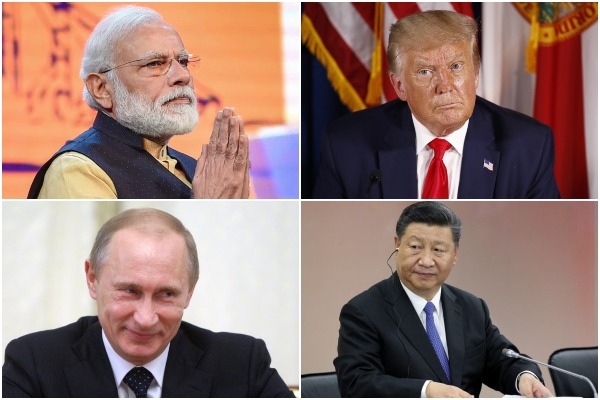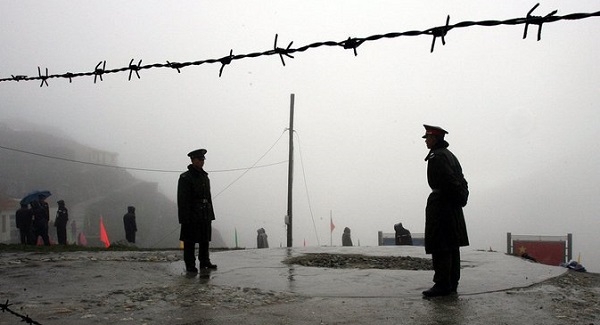Its a Quad, Quad, Quad, Quad World
Total Views |
On 17 August 2020, the Democratic Presidential nominee in USA, Joe Biden asserted that if “elected his administration will ‘stand with India’ against threats that New Delhi faces from its own region and along its borders and vowed to continue to rely on the Indian-American diaspora, that ‘keeps the two nations together’.” Around 23 July 2019; the current President of the United States of America, Donald Trump had stated (actually he just told a lie) that India had invited him to mediate in the Kashmir dispute, a lie that was firmly denied by the Indian foreign ministry.
On the auspicious occasion of India’s 74th Independence day, the Russian President Vladimir Putin stated that “India rightfully enjoys high prestige among the international community”.
And the Chinese President Xi Jinping’s policy towards India has transcended from arrogance to fear; upon realizing that India has changed from being a neighboring country to a major power and a powerful economic adversary.

The above three ‘super-powers’ have realized that India has transformed itself from being a impoverished nation to a modern power-house of Industry, technology, education and most importantly, defence. This has led to China consistently testing India’s resilience at Depsang in 2013, Chumar in 2014, Doklam in 2017 and the Galwan valley on 15 June 2020; which shows that Xi’s approach to India is becoming increasingly confrontational. Initially, during the September 2014 visit of Xi to India he had highlighted China’s acknowledgement of their necessity to forge a developmental partnership with India, whereby Xi had aimed to channelize its economic diplomacy with India. However, India’s steadfast opposition to the Belt and Road Initiative [BRI] has frustrated Xi’s approach, and he now views India as an adversary whose resolute stance has made him nervous enough to pursue a confrontational foreign policy approach.
This is a stark testimony of India as a risen power which is constantly confronting China’s foreign policy, especially in the Indo-Pacific area; with its outreach in East Asia, the Indian Ocean region and Pacific Islands. On the global front, India has built strong strategic relationships with USA, Europe and other nations of the Commonwealth, and strengthened its old-age bonds with Russia. Under the leadership of Prime Minister Narendra Modi, initiatives in the Middle-East have resulted in better diplomatic, and economically robust ties with Iran and Saudi-Arabia, while still pursuing a strong working relationship with Israel, with a focus on technology cooperation in areas as varied as agriculture, non-conventional energy and defense.
After the Doklam and Galwan confrontations, India has emerged on the global arena as a nation that is incapable of weakness to the dictates of China and refuses to be a victim of China and its President Xi’s pressure tactics. While the relationship between India and China gets more fragmented on the economic and trade fronts, the India-US partnership has been growing in strength, specially in defense and security, with the signing of the Logistics Exchange Memorandum of Agreement of 2016, and the Communications Capability and Security Agreement of 2018. India has also signed the Special Strategic and Global Partnership agreement with Japan and upgraded its Comprehensive Strategic Partnership with Australia. India’s growing engagement with New Zealand, South Korea and Vietnam has heightened India’s stature as a strong power which in turn, has added to the insecurities of older power structures.

While India is strengthening its defence ties with the U.S, it continues to maintain its friendly security relationship with Russia, ensuring that Russia remains India’s largest arms supplier with almost 60% of the latter’s weapons imports. As a constantly growing power, India will pursue multiple alignments and engagements to ensure its neutrality between Western and Eastern military alliances. An example is India’s strategic autonomy while engaging with the US, Australia and Japan in the Quadrilateral Security Dialogue [QUAD]. Contrary to the frustrations of mostly the U.S. officials who like to have a docile partner subjugated to their will-power in any military alliances or arrangements; the path of autonomy that India walks firmly on, does hold a high degree of strategic value for its own global perspective.
Basically, India values its freedom of diplomatic outreach to any country, contingent on India’s own interests and priorities. India’s foreign policy will continue to remain a combination of diplomatic engagement and military posturing for balancing its various bi-lateral and multilateral engagements. India follows the value of “realpolitik”, which emphasizes the self-interest and security of our Nation above all else, whereby to achieve maximum power, the nation has to enter into various alliances, coalitions and create a balance of power. Attaining permanence of global interests is a practical necessity of any powerful nation; and this can only be achieved by remaining pragmatic while avoiding foreign ideologies and abstract policies.
There should be no doubt in the minds of friends and foes alike that India is now a major anchor of a quadri-polar world and will only continue to grow in strength and international influence.

